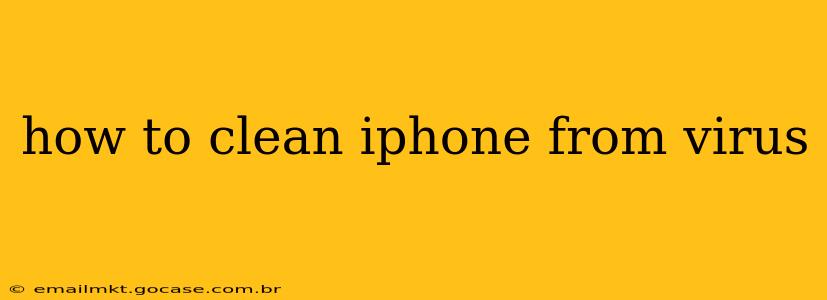While the term "virus" often gets thrown around when discussing smartphone issues, it's crucial to understand that iPhones are inherently less susceptible to viruses than computers running Windows or older versions of Android. Apple's iOS operating system and its App Store's rigorous vetting process create a significantly more secure environment. Instead of viruses, iPhone users often encounter problems stemming from malware, phishing scams, or simply performance issues that feel like an infection. This guide clarifies how to address these problems and alleviate concerns about your iPhone's security.
What are the signs my iPhone might be infected?
This is a critical first step. Many users mistake slow performance, battery drain, or strange app behavior for a virus. While these can sometimes indicate a problem, they are more often related to software glitches, full storage, or outdated apps. True signs of malicious activity are far less common and would include:
- Unexpected pop-ups or ads: Aggressive ads that appear even when you're not using a browser are suspicious.
- Unusual data usage: A sudden spike in your mobile data or Wi-Fi usage without explanation could point to a problem.
- Apps behaving strangely: Apps crashing frequently, launching unexpectedly, or displaying unusual behavior warrant investigation.
- Phone overheating: Prolonged, unexplained overheating could indicate a resource-intensive process, but is more likely tied to background processes or hardware issues.
- Loss of control over your device: If you find yourself unable to access certain settings or apps, this is a serious red flag.
How to protect your iPhone from potential threats?
Prevention is always better than cure. Here are some best practices to keep your iPhone safe:
- Download apps only from the App Store: This is the most significant safety net. Apps from unauthorized sources pose a much greater risk.
- Keep your iOS updated: Apple regularly releases updates that patch security vulnerabilities. Enable automatic updates to ensure your iPhone is always running the latest version.
- Be wary of phishing scams: Avoid clicking on links or opening attachments from unknown senders, especially those asking for personal information.
- Use strong passwords and two-factor authentication: Protect your Apple ID with a robust password and enable two-factor authentication for an extra layer of security.
- Be mindful of public Wi-Fi: Avoid accessing sensitive information on public Wi-Fi networks. Use a VPN if necessary.
- Regularly check your device usage: Monitor your data usage and app activity for any anomalies.
How do I remove unwanted apps or malware?
If you suspect a problematic app, the solution is straightforward:
- Uninstall the app: Go to your iPhone's home screen, press and hold the app icon until it wiggles. Tap the "X" to delete it.
- Restart your iPhone: A simple restart often clears temporary files and glitches.
- Check your device storage: If your iPhone storage is full, it can cause performance issues. Delete unnecessary files, photos, or videos to free up space.
My iPhone is slow – is it a virus?
Slow performance is rarely a sign of a virus. More likely causes include:
- Insufficient storage: Delete unused apps, photos, and videos.
- Outdated software: Update your iOS to the latest version.
- Background apps: Close unused apps running in the background.
- Hardware issues: If the issue persists after trying the above steps, consider contacting Apple support.
Can I get a virus from a website on my iPhone?
While less likely than on a computer, it's possible to encounter malicious websites that try to trick you into downloading harmful software. Stick to reputable websites and avoid clicking on suspicious links.
How can I scan my iPhone for malware?
There aren't any truly effective "antivirus" apps for iOS that are necessary. Apple's built-in security features are generally sufficient. If you're concerned, focus on the preventive measures mentioned earlier.
Should I use an antivirus app on my iPhone?
No, you generally don't need an antivirus app for your iPhone. Apple's security measures are robust. Many antivirus apps for iOS offer limited functionality and may even slow down your device.
In conclusion, while iPhones aren't immune to all security threats, the risk of a true virus infection is exceptionally low. By following good security practices and addressing performance issues proactively, you can keep your iPhone running smoothly and securely. If you experience persistent problems, contacting Apple support is always a good option.
